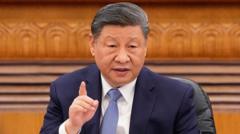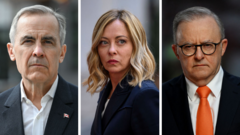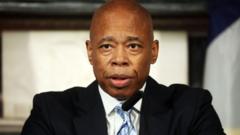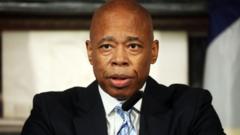As Rubio engages with European leaders, anxiety grows over an approach perceived as leaning towards appeasement of Russia by the Trump administration.
**Marco Rubio's NATO Visit: Navigating U.S.-Europe Relations Amid Trump's Agenda**

**Marco Rubio's NATO Visit: Navigating U.S.-Europe Relations Amid Trump's Agenda**
Secretary of State Marco Rubio's recent trip to NATO raises concerns over shifting U.S. policies toward Russia and Ukraine.
Secretary of State Marco Rubio's visit to Brussels, where NATO foreign ministers convened, has drawn significant attention amid growing concerns about the implications of President Trump's foreign policy, particularly regarding the war in Ukraine and relations with Russia. This marks Rubio's first major engagement as a senior official under the Trump administration and reflects a sharp pivot from the cooperative stance seen during President Biden's tenure.
European allies express unease over Trump's inclination to expedite peace efforts in Ukraine, fearing it may inadvertently bolster Russian President Vladimir Putin's position. Despite such worries, Rubio, known as a staunch advocate for NATO, aims to reassure and strengthen alliances amidst shifting sentiments. His past as a senator who supported legislation mandating presidential consultations before withdrawing from NATO has already drawn increased scrutiny, particularly in light of Trump's rumored intentions to reconsider U.S. involvement in the alliance.
While Rubio attempts to moderate Trump's more extreme positions, foreign counterparts question how closely his policies align with an administration that often appears to prioritize short-term gains over long-term diplomatic strategies. As mistrust mounts, many European leaders are anxious about navigating a partnership they once viewed as solid and reliable.
Rubio's delicate balancing act will be critical in the coming months as Europe strives to maintain unity in support of Ukraine while addressing the broader implications of an unpredictable U.S. agenda threatening established norms in international relations and security. The future of NATO cooperation hangs in the balance as leaders engage in ongoing discussions on maintaining a cohesive response to Russia's actions.
European allies express unease over Trump's inclination to expedite peace efforts in Ukraine, fearing it may inadvertently bolster Russian President Vladimir Putin's position. Despite such worries, Rubio, known as a staunch advocate for NATO, aims to reassure and strengthen alliances amidst shifting sentiments. His past as a senator who supported legislation mandating presidential consultations before withdrawing from NATO has already drawn increased scrutiny, particularly in light of Trump's rumored intentions to reconsider U.S. involvement in the alliance.
While Rubio attempts to moderate Trump's more extreme positions, foreign counterparts question how closely his policies align with an administration that often appears to prioritize short-term gains over long-term diplomatic strategies. As mistrust mounts, many European leaders are anxious about navigating a partnership they once viewed as solid and reliable.
Rubio's delicate balancing act will be critical in the coming months as Europe strives to maintain unity in support of Ukraine while addressing the broader implications of an unpredictable U.S. agenda threatening established norms in international relations and security. The future of NATO cooperation hangs in the balance as leaders engage in ongoing discussions on maintaining a cohesive response to Russia's actions.






















